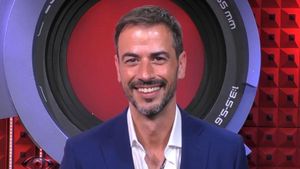With growing uncertainties over U.S. visas, many Indian applicants are turning to divine intervention for solace and assistance, flocking to temples renowned for granting blessings aimed at securing H-1B visa approvals. The rise of this trend can be largely attributed to increasingly stringent immigration laws instituted during Donald Trump's administration, which have left many aspiring emigrants feeling anxious and desperate for help.
Taking their hopes to sacred ground, worshippers have been seen at temples across India, including the Chilkur Balaji temple near Hyderabad and the famous Visa Hanuman temple located in Ahmedabad. Ashok Sundar, who recently had his H-1B visa approved, visited the Chilkur Balaji temple, which he refers to as the 'visa god' temple, to express his gratitude for what he believes is divine assistance.
The streets surrounding these temples are filled with individuals presenting their petitions to the deities, with some performing unique rituals for their visa prospects. The Visa Hanuman temple, for example, has gained notoriety for fostering hopes of visa approvals among aspirants. Vijay Bhatt, the temple priest, introduced visitors to traditional practices where applicants lay their passports before the idol of Lord Hanuman and recite hymns and prayers. "It’s all about faith," Bhatt stated. "If you believe, it will happen. If doubts creep in, disappointments follow." For many, these rituals have created instances where applicants reported receiving approvals almost immediately after their pujas—sometimes even after previous rejections, persuading individuals to travel long distances to seek this divine intervention.
While seeking blessings for improved chances of emigration, visa applicants express deep-rooted anxieties rooted within the current geopolitical environment. The H-1B visa, which permits skilled workers, especially software engineers from India, to seek employment opportunities within the U.S., has come under scrutiny. The uncertainty around the visa has incited fear among potential applicants and stirred concerns about not only professional aspirations but personal futures.
At the Chilkur Balaji temple, diligently aspiring emigrants participate in elaborate rituals. Some devotees have shared accounts of performing as many as 108 circumambulations around the temple barefoot, each step echoing their prayers for visa approval. It is not unusual to see fellow visa seekers supporting one another during these faith-filled rituals, reinforcing the community aspect of this shared endeavor. An anonymous software engineer, just back from offering his thanks for his visa approval, noted, “Eleven of us applied last year, but I was the only one who got it.”
Among the crowds are individuals like Chandana, 26, who remains hopeful amid grim political realities. Despite uncertain prospects following Trump's election, she maintains unwavering faith, stating, “I know things aren’t looking bright right now, but I have faith I will get it, just like my relatives did.” She has made her way to the temple every month for the past two years, illustrating the emotional investment many applicants are putting forth.
The rituals adhered to by the temple-goers don’t stop at hymns and prayers. At the Shree Siddhi Peeth Chamatkari Hanuman Mandir located in Delhi, devotees undertake rigorous fasting routines, abstaining from meat, alcohol, onions, or garlic for up to 41 days, all aimed at enhancing their devotion and calls for divine favor over their visa applications. Temple priest Narayan Mishra remarked on the emotional state of applicants, saying, “People come in a very disturbed state of mind. This is their last resort, and we usually find their wishes do come true.” Offering up written wishes and placing them before the deity adds another dimension to this expression of faith, as applicants express their hopes through physically represented words.
Whether viewed as superstition or genuine faith, these rituals symbolize the desperation many Indian professionals face amid shifting immigration landscapes. The stark reality is woven with the cultural threads of faith, community, and the relentless pursuit of opportunity. Amid challenging prospects, the temples stand as sanctuaries, ensuring devotees remain hopeful for their American dream, believing their prayers might just translate to successful visa approvals.



